Rizact 10mg Tablets
$100.00 – $288.00Price range: $100.00 through $288.00
| Pack Size | Price | Price / Unit | Quantity | |
|---|---|---|---|---|
| 40 Tablets | $100.00 | $2.50/ unit | ||
| 80 Tablets | $196.00 | $2.45/ unit | ||
| 120 Tablets | $288.00 | $2.40/ unit |
Want to order in bulk / B2B price ? | Send Inquiry |


| SKU | 11485 |
| Manufacturer | Cipla Limited |
| Categories | Pain Relievers |
| Delivery Time | 10 - 14 Working Days |
| Strength | 10mg |
Introduction to Rizact 10mg Tablets
Rizact 10mg tablets are a medication primarily prescribed for the treatment of migraines in adults. Each tablet contains Rizatriptan, which is classified as a triptan. Triptans like Rizatriptan work by constricting blood vessels around the brain and blocking the release of certain natural substances that cause pain and other symptoms of migraines.
When taken at the onset of a migraine attack, Rizact helps to alleviate symptoms such as severe headache, sensitivity to light and sound, nausea, and vomiting. It is important to note that Rizact is not intended for the prevention of migraines or for the treatment of headaches other than migraines.
The typical recommended dosage for adults is a single 10mg tablet taken orally with water. If the migraine symptoms persist or return after an initial dose, a second dose may be taken after at least 2 hours, not exceeding a total of 30mg within 24 hours.
Uses of Rizact 10mg
Rizact 10mg, containing the active ingredient Rizatriptan, is primarily used for the treatment of migraines. Here are the main uses of Rizact 10mg:
- Acute Treatment of Migraine Attacks
- Throbbing headache pain
- Nausea or vomiting
- Sensitivity to light (photophobia)
- Sensitivity to sound (phonophobia)
How Does Rizact 10 mg Tablets Works?
Rizact 10 mg tablets contain rizatriptan, a medication from the triptan class. It works by stimulating serotonin (5-HT1B/1D) receptors in the brain, which helps to narrow swollen blood vessels that are believed to cause migraine pain. This action reduces pressure and inflammation around the brain, relieving the intense headache.
Additionally, Rizact blocks the release of certain chemicals that trigger pain, nausea, and other migraine-related symptoms. It is not a painkiller, but it specifically targets the cause of migraines and is most effective when taken at the first sign of a migraine attack.
Side Effects of Rizact 10mg
Common Side Effects
- Dizziness or light-headedness
- Tiredness or fatigue
- Dry mouth
- Drowsiness or sleepiness
- Nausea
- Chest discomfort
- Tingling or numbness
Serious Side Effects
- Chest pain or tightness
- Shortness of breath or difficulty breathing
- Irregular or fast heartbeat
- Severe stomach pain
- Sudden numbness or weakness
- Slurred speech or confusion
Dosage of Rizact 10mg
Symptoms of overdose of Rizact 10 Tablet include sleepiness, dizziness, fainting, vomiting etc. If you have taken too much of this medicine then contact your doctor or reach out to the nearest hospital immediately.
How To Manage Side Effects?
Managing side effects of Rizact 10 mg (rizatriptan) involves both prevention and relief strategies. Here’s how you can handle them effectively:
- Avoid driving or operating machinery until you know how the medicine affects you.
- Rest in a quiet, dark room during a migraine episode.
- Sip water frequently, chew sugar-free gum, or suck on sugar-free lozenges.
- Eat light meals and avoid greasy or spicy food.
- Ginger tea or anti-nausea medications (if approved by your doctor) may help.
- Usually mild and temporary—rest and keep calm.
- Inform your doctor if it worsens or becomes painful.
Warnings & Precautions
Here are the warnings and precautions you should keep in mind before using Rizact 10 mg (rizatriptan):
1. Heart Conditions
- Not recommended if you have heart disease, a history of heart attack, angina, or uncontrolled high blood pressure. May cause narrowing of blood vessels, which can trigger heart-related issues.
2. Stroke or TIA History
- Avoid if you’ve had a stroke or mini-stroke (TIA), as it may increase the risk of another.
3. Liver or Kidney Issues
- Dose adjustment may be needed—consult your doctor.
4. Serotonin Syndrome Risk
- Combining Rizact with SSRIs, SNRIs, MAO inhibitors, or certain antidepressants can cause a serious condition called serotonin syndrome.
5. Pregnancy and Breastfeeding
- Use only if clearly needed and prescribed. Inform your doctor if you are pregnant, planning to become pregnant, or breastfeeding.
Frequently Asked Questions
1. Can I drink alcohol while taking Rizact 10mg?
Ans. It is generally recommended to avoid alcohol while taking Rizact, as it may increase the risk of certain side effects such as dizziness and drowsiness. Always consult with your healthcare provider for personalized advice.
2. Can Rizact 10mg tablets be taken during pregnancy or breastfeeding?
Ans. It is recommended to avoid using Rizact during pregnancy and breastfeeding unless the potential benefits outweigh the risks. Consult with a health care provider for guidance in these situations.
3. Who should not take Rizact 10mg?
Ans. Rizact should not be taken by individuals with certain medical conditions such as uncontrolled high blood pressure, heart disease, or a history of stroke. It is important to inform your doctor about your medical history and current medications before starting Rizact.
4. Is it safe to drive or operate machinery after taking Rizact 10mg?
Ans. Rizact may cause dizziness or drowsiness in some individuals. If you experience these side effects, avoid driving or operating machinery until you know how Rizact affects you.
| Pack Size | 120 Tablets, 40 Tablets, 80 Tablets |
|---|---|
| Price/Unit | $2.40/unit, $2.45/unit, $2.50/unit |
1 review for Rizact 10mg Tablets
Add a review Cancel reply
Related Products
No related Products Found

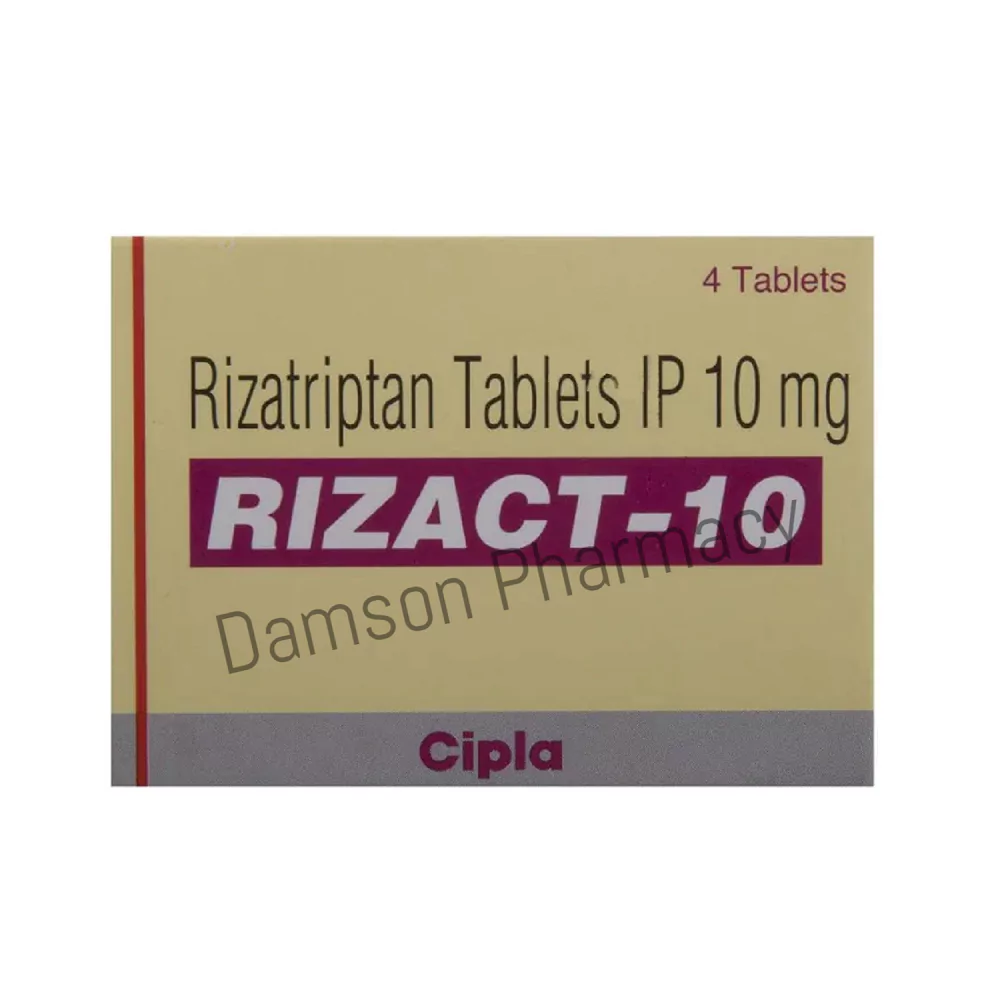
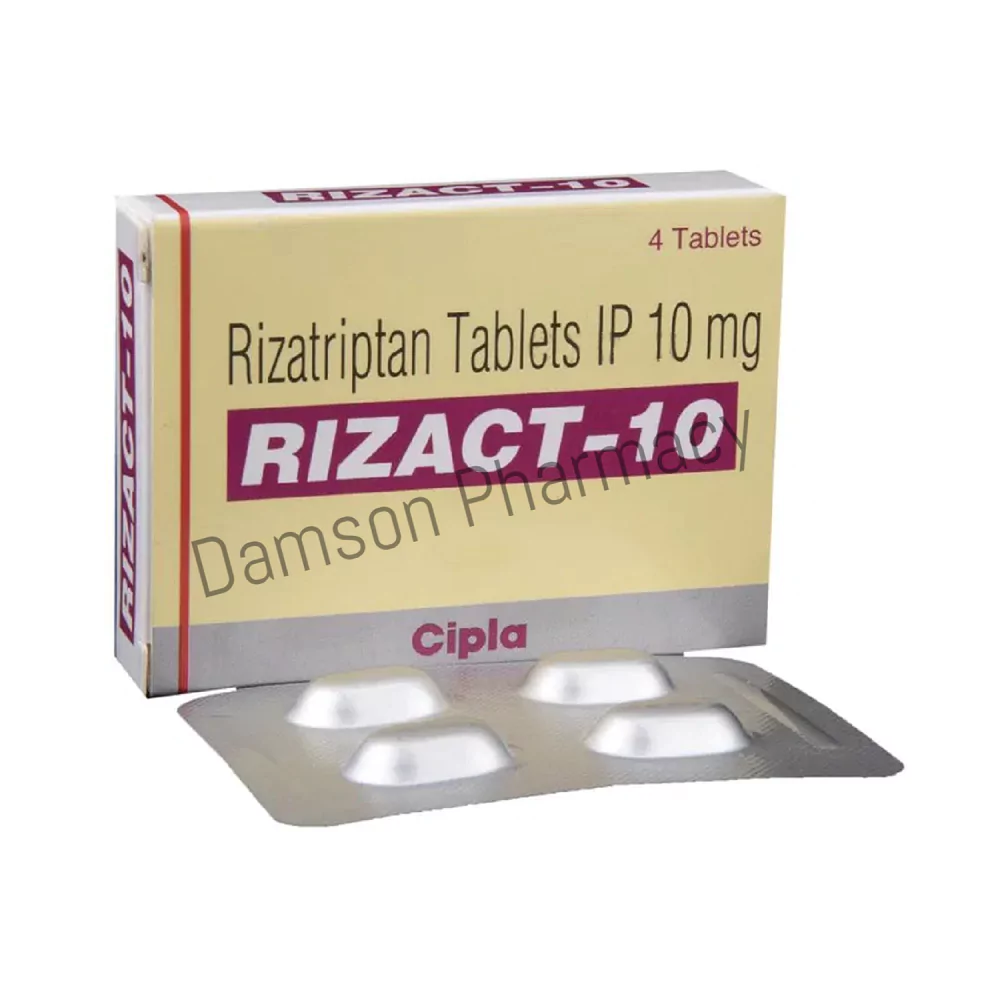


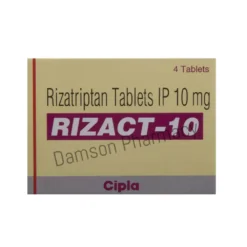



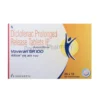
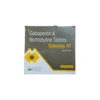
Terry Ortiz –
the orders were delivered to me exactly as described.USA purchaser.